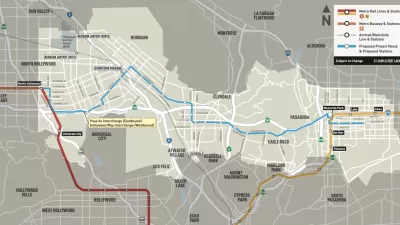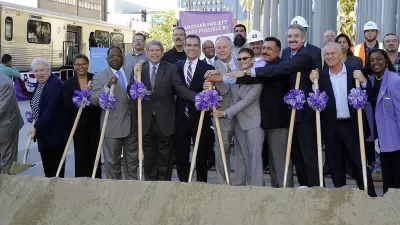Similar to microtransit on demand programs in other cities, Los Angeles' ongoing experiment is proving to be very expensive (for the public) for the benefit of very few riders.
"A half-year into Metro and Via’s year-long 'Mobility on Demand' pilot shows that ride-hail continues to be an expensive way to provide mobility for very few riders," reports Joe Linton.
The Via pilot launched in January 2019, with funding assistance from the federal government, offering on-demand, fixed-price ride-hailing services in the hopes of providing first-last mile connections to and from several specific stations in the Los Angeles County Metropolitan Transportation Authority system.
"Last month, Metro released its five-page second quarter update report showing the latest statistics for the transit-on-demand pilot," according to Linton. While ridership with the program is growing, thanks to expensive efforts to grow ridership, "total ridership is still dismal," writes Linton.
"With a $1.75 million Metro expenditure for one year – 260 weekdays in that year, Metro is spending $6,730 per day for these rides. 1,675 rides per week translates to 335 rides per day. 335 rides for $6,730 means that each ride is costing Metro $20.09 (that is just Metro’s cost – these also cost FTA and forgo Via’s “risk sharing”)."
FULL STORY: Six Months in, Metro/Via Mobility on Demand Pilot is an Expensive Flop

Alabama: Trump Terminates Settlements for Black Communities Harmed By Raw Sewage
Trump deemed the landmark civil rights agreement “illegal DEI and environmental justice policy.”

Planetizen Federal Action Tracker
A weekly monitor of how Trump’s orders and actions are impacting planners and planning in America.

How Atlanta Built 7,000 Housing Units in 3 Years
The city’s comprehensive, neighborhood-focused housing strategy focuses on identifying properties and land that can be repurposed for housing and encouraging development in underserved neighborhoods.

In Both Crashes and Crime, Public Transportation is Far Safer than Driving
Contrary to popular assumptions, public transportation has far lower crash and crime rates than automobile travel. For safer communities, improve and encourage transit travel.

Report: Zoning Reforms Should Complement Nashville’s Ambitious Transit Plan
Without reform, restrictive zoning codes will limit the impact of the city’s planned transit expansion and could exclude some of the residents who depend on transit the most.

Judge Orders Release of Frozen IRA, IIJA Funding
The decision is a victory for environmental groups who charged that freezing funds for critical infrastructure and disaster response programs caused “real and irreparable harm” to communities.
Urban Design for Planners 1: Software Tools
This six-course series explores essential urban design concepts using open source software and equips planners with the tools they need to participate fully in the urban design process.
Planning for Universal Design
Learn the tools for implementing Universal Design in planning regulations.
Jessamine County Fiscal Court
Caltrans
Institute for Housing and Urban Development Studies (IHS)
City of Grandview
Harvard GSD Executive Education
Toledo-Lucas County Plan Commissions
Salt Lake City
NYU Wagner Graduate School of Public Service




























